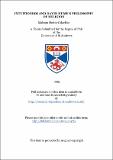Intuitionism and David Hume's philosophy of religion
Abstract
Humean philosophy has been defined in the following ways. (a) A system based on the classical influence of Cicero. (b) An attempt to offer a parallel in moral philosophy to Sir Isaac Newton's contribution to the physical sciences. (c) Intuitionism based on the Shaftesbury/Hutcheson tradition. If we consider Hume's scholarly output as a whole, it would appear difficult to select one work and claim that it represents a definitive, final position. The approach which is taken in this study is that of following the development of Hume's thinking, from his early education through to that stage in his career which saw the completion of his major philosophical works. For a significant part of the later period of his career he broke no new ground in his philosophical studies; but was content to revise his earlier works, turning attention instead to literature, history and religious disputes. When this approach is followed it becomes obvious that the secular interpretation of Humean philosophy, which has gained a great deal of acceptance this century, is far from convincing. Hume in fact wrote a fairly conservative work on natural Religion. Moreover, his Intuitionism makes little sense without the religious foundation which Shaftesbury and Hutcheson had taken for granted. What new, significant contribution did Hume make? His work can be looked upon as a fine example of 'applied philosophy', anticipating the insights of modern clinical psychology at a number of points. It is important to see Hume as working in an educational tradition. Scottish, humanistic, Reformed. His family was Presbyterian, and the young Hume would have received a good Christian training. Although he was not considered an outstandingly bright pupil, he attended Edinburgh University at an early age, and soon developed a voracious appetite for reading scholarly literature on his own. The deeply introspective side of his philosophical studies may well have come from his Presbyterian background.
Collections
Items in the St Andrews Research Repository are protected by copyright, with all rights reserved, unless otherwise indicated.

